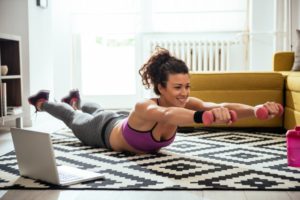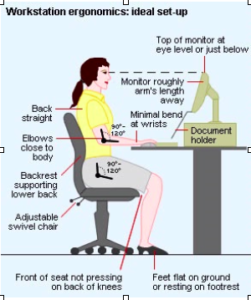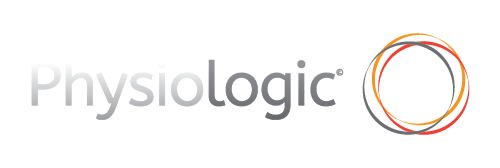We often see an increase in injuries when there is a spike in activity- pre season or returning to sport after a holiday are good examples of this. With all sporting league and activities currently on hold, it is important to try and maintain your fitness as much as possible to avoid this spike in load on your return to sport when allowed. Here are some tips to keep you active over the next couple of months:

1. Try and maintain a schedule- if you are used to training twice a week then continue to allocate two sessions a week to ‘at home training’. Keeping a consistent load will help avoid any major drops or spikes in load which are often linked to soft tissue injuries. The Department of Health recommend kids aim for 60 minutes of moderate to vigorous activity per day while adults should aim for 30 minutes
2. Sport specific injury prevention programs- now is a great time to complete these programs such as the FIFA 11+ for soccer or KNEE program for netball. Both of these programs incorporate strengthening exercises that can be done with very little space needed. They aim to improve your strength, balance and co-ordination to help prevent soft tissue injuries and improve your movement efficiency. Aim to complete
a strength program like this 2-3 times per week, it should take roughly 20 mins per session.
3. Break up your ‘at home training’ into cardio, strength and skill if possible. Access to fields and equipment is limited so get creative! Your cardio may now be riding a bike (stationary or out on a path/road), swimming in your pool at home or going out for a run around the neighbourhood. If you don’t have a home gym set up your strengthening can be done with body weight exercises, injury prevention programs
(ideas listed above) or via virtual classes. There are a few Pilates studios/gyms offering virtual exercise classes that you can complete at home.
4. Don’t forget to warm up/cool down- just like your usual sport training session would include a warm up, don’t forget to do this as part of your ‘at home training’ as well. This could be as simple as a brisk walk, light jog, dynamic stretches etc for your warm up.
5. Good time to get your niggles sorted- have you been struggling with a bit of soreness/tightness on and off so far this year? Now is a great time to see your physio for an assessment and work on any rehab while the season is on hold so you can return fit and ready to go!
SO you’re over 55, got an arthritic joint and you’re at a higher risk of problems associated with COVID-19, self isolating and/or limited outdoor time
Managing Osteoarthritic (OA) joints can become a little difficult especially when a large part of the management of chronic OA revolves around exercise.
an OA joint may cause you to feel
- Pain
- Stiffness – morning especially
- weakness
- Crunching or grinding noise
- Poor exercise tolerance
- giving way (lower extremity joints eg. hip / knee)
The best way to manage your OA well in the coming months is
A) Watch your weight
- your activity levels are likely to be less – make sure you offset this by doing your best to avoid weight gain
B) Diet
- ensure a nutritious balanced diet – there is some evidence to suggest that anti-inflammatory foods play a role in reducing inflammation associated with OA
C) Exercise
- it is important to continue to exercise to a level that doesn’t make your symptoms worse
- a combination of strengthening exercises is best – Physio can help here
- avoid peaks and troughs in your activity levels – often pain presents if you’ve had a break and then try to resume
D) Medication
E) Sleep
- to date sleep is the only proven recovery and rejuvenating activity that is research backed
- also sleep appears to impact on the severity of ones symptoms ie. Less or poor sleep seems to make things worse
D) Physiotherapy
YES! Exercise and physiotherapy can greatly affect joint healthy – improve your function and reduce pain. Physiotherapy and education should be the first port of call before any surgical procedures.
WHY and HOW does Physio help?
- Osteoarthritic joints need a healthy amount of load – this can promote cartilage growth by stimulating synovial fluid to nourish the joint
- Bones become stronger and resilient with weight bearing exercises
- Weight loss reduces the direct load on the joint
- Exercise can decrease inflammatory chemicals around the body that may contribute to OA
- Pain relief – Exercise release endorphins that can cause less pain and increased feelings of well being
- Exercise benefits the cartilage by developing stronger muscles / increase range of motion and better muscle motor control
Contact Physiologic on 55787155 to book an appointment OR an offsite Telehealth appointment today to manage your OA.
EXERCISE and WELL BEING – an absolute must in this time of uncertainty.
Staying home will see your freedom and your physical and mental capacity challenged in the coming weeks/months.
We have spent some time looking at some of the best ways to keep active whilst COVID 19 exists
Check it out below
1. OUR RESIDENT PT – ALEX KIEDORF
– currently an amazing opportunity exists to get your training structured, supervised and fun
– Alex operates out of Physiologic and with the clinic still open she is available.
– WE ARE PRACTICING THE STRICTEST HYGIENE AT PHYSIOLOGIC – CLICK HERE TO SEE WHAT WE ARE DOING
– with gyms currently being closed due to COVID 19 and people gathering limited to 2 only – you can still get your supervised PT sessions
–
Click here to see Alex’s bio –
ring us on 55787155 to make time
Don’t forget our live FB YOGA with Alex
– we go LIVE on facebook with Alex Kierdorf for YOGA workouts
– tune in Fridays at 7.30am
– basic yoga with a little bit of slow flow suitable to all levels
– All you need is a mat (or carpet), water bottle and a rolled up towel.
2. NTC (nike training club app) – its free
– amazing collection of exercise sessions and information all based around you training at home
– allows for people with minimal gym equipment but also for people who may have basic gym equipment at home
– includes YOGA, cardio and HIIT, STRENGTH TRAINING, MOBILITY WORKOUTS
– PLANS – you can tailor a weekly plan suitable for your schedule
3. CENTR – Chris Hemsworth’s wellness APP
– currently has a 6 week trial period in light of COVID 19 pandemic –
check it out– great resource focussing on all areas of wellness
– leaders in each field to instruct sessions
– NUTRITION, YOGA, STRENGTH WORK, CARDIO, HIIT, MINDFULNESS, LIVE SESSIONS
4. HUSTL – females this one’s for you
– an amazing local brand fresh out of Byron Bay
– have found a niche market as a boutique fitness studio offering a great combination of progressive pilates and circuit training
– low impact based training so risk of injury is super low
– the free online classes also touch the mind body connection with Yin yoga, manifesting and meditation sessions
– amazing instructors – engaged with their community, you’ll feel connected, revived and wanting to join the daily live stream
– currently running free online classes, please enter your email to receive all the Online Class details and timetable – check it out here
Heres our Top 5 tips on how to avoid spinal pain
1. Changeup your posture
– don’t spend more than 20 min before changing your posture
– go from kneeling to standing to sitting back to kneeling
2. Exercise daily
– spend 30-45 min most days doing some form of exercise
– break it up into
A) Cardio eg. walk / jog
B) strength work eg push ups
C) circuit work – mixture of both
- check out our blog on how to exercise during COVID 19
3. Workstation setup
- see below for how to set yourself up

4. Take regular breaks
- you should break from the your workstation every 20-30 min – for 2 min at a time
- take this opportunity to roll your shoulders, stretch your neck and do some back bends
5. Use self management strategies
- foam rollers
- spikey balls
- therabands
see below



Cricket is one of the most popular sports to play for young people and engaging in sports such as cricket provide numerous health benefits. However, like any other sport playing cricket involves some risk of injury.
The young athlete is particularly vulnerable due to some of the physical and physiological processes during the growth period. Additionally, some might be an increased risk due to poor coordination, strength and skills.
Some common injuries that frequently come into the clinic include lower back pain, knee pain and heel pain. Below I will describe some of the common injuries that occur in younger athletes.
Low Back Pain
Back pain is common particularly in cricket due to the high demands that the sport has on a person’s back, particularly for bowlers. The back is particularly vulnerable in adolescents during the growth period. Generally speaking, young people respond really well to physiotherapy and a structure strength and conditioning program.
Knee pain otherwise referred to as Osgood-Schlatter’s
This is an extremely common condition in adolescents at the time of a growth spurt. It is typically associated with sports that involve running and jumping. Osgood-Schlatter’s is a self limiting condition that generally settles with time, however, physiotherapy can be beneficial for pain management and strengthening of the leg.
Heel Pain otherwise referred to as Sever’s Apophysitis
Heel pain is another common complaint in adolescents. Once again sever’s is common in children that play sports that involve running and jumping. Physiotherapy is very effective in managing pain and providing advice on activity modification for children who have Sever’s Apophysitis.
If you or anyone else has got an injury similar to the injuries that are explained above, please feel free to get in contact with one of the fantastic physiotherapists here at Physiologic and get an assessment to see how you can best manage and treat your injury.

COVID-19 Screening Questionnaire
- Are you feeling unwell with symptoms such as fever, sore throat, cough or shortness of breath?
- Have you had close contact* with someone who has a confirmed case of coronavirus (COVID-19)? *Face-to-face contact for more than 15 minutes, or have shared an enclosed space for more than two hours.
- Have you travelled overseas in the last 14 days?
- Did you arrive in this state from another state after midnight Wednesday 25 March?
If you answered yes to any of the questions above, we recommend that you:
- Reschedule your appointment for as soon as possible after the 14-day exclusion
- Self-isolate at home for 14 days (as per the government protocols) after any international travel or if you have had close contact with a person with confirmed COVID-19 while infectious.
- Please call your GP if you develop any respiratory symptoms or fever.
First published March 26, 2020 12:40pm. Updated 6th January 8:30am AEST
At Physiologic, we’re focused on the well-being of every person who steps through our clinic doors. This includes the health and safety of our local communities, which is you, our patients, as well as our team members.
➕ We want to reassure you that we are closely monitoring the Coronavirus (COVID-19) situation, are regularly updating our internal policy and processes according to any daily mandates and recommendations from the government and the Department of Health.
➕ Following government guidelines, we are asking all people who have travelled in the last 14 days not to present to the clinic. We are helping to reschedule appointments, and we look forward to welcoming these patients back following the appropriate period of quarantine.
➕ We are asking patients to let us know if they are showing signs or symptoms of the Coronavirus. Should this be the case we are rescheduling appointments and requesting clearance by their GP or evidence of a returned a negative test.
➕ We have made hand sanitisers and hand-washing facilities available to all our team members and patients within the clinic. We are following best guidelines from the Department of Health for cleaning our clinic facilities, waiting areas and equipment.
➕ Where possible clinics are being re-arranged to ensure there is less close contact between patients, and as able we are moving our patients quickly through and away from the common areas. This includes implementing the current social distancing guidelines (2m apart, 1 person per 4m squared inside).
Click here for current information from the Australian Government Department of Health
Other ways you can help us, help you.
Steps you can take:
- Wash hands often with soap and running water, for at least 20 seconds. Dry with paper towel or hand dryer.
- Use an alcohol-based hand sanitiser if you don’t have access to wash hands with soap and water
- Try not to touch your eyes, nose or mouth
- Cover your nose and mouth with a tissue when you cough or sneeze. If you don’t have a tissue cough or sneeze into your upper sleeve or elbow
- Call your GP first if you need medical attention. They will advise you what to do
- Continue healthy habits: exercise, drink water, get plenty of sleep
- If you have flu like symptoms or you are presenting as unwell, please call our clinic where our reception team will assist you to reschedule your appointment.
- Practice social distancing and avoid touching, shaking hands, kissing, hugging, and other intimate contact with others
- We ask that only the individual being treated attend the clinic. In the interests of health and safety for all we are attempting to minimise the number of people in the waiting room at any given time.
Some extra items to now bring along to your appointment:
- Please bring two (2) clean towels and/or a pillowcase for your personal use during your appointment.
- Pen (if you would prefer not to use the pens at our reception desk)
- Water bottle
We appreciate that this is a challenging time for all and that some of these measures may create some disruption to your treatment. Thank you for your patience and understanding. We are committed to doing everything we can continue to deliver a safe and reassuring service to all of our valued patients.






